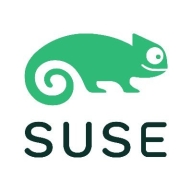

SUSE Linux Enterprise and Windows 11 competently vie in the operating system category. SUSE's integration strengths, especially with SAP HANA, give it an edge in enterprise environments, while Windows 11 stands out for device compatibility and performance.
Features: SUSE Linux Enterprise includes ease of management with the YaST tool, strong security measures with features like HANA firewall integration, and flexibility for web-based applications. Windows 11 offers automatic screen recording, advanced taskbar management, and integration capabilities with Azure AD, praised for compatibility and desktop management.
Room for Improvement: SUSE Linux Enterprise could improve package updates and cloud integration, and reduce high pricing. Windows 11 needs stability enhancements to address system hangs, better system update processes, and improved integration and driver support.
Ease of Deployment and Customer Service: SUSE Linux Enterprise provides flexible cloud deployment, with strong IT support, although development-level support needs improvement. Windows 11's help resources are available, yet direct technical support lacks, affecting deployment adaptability.
Pricing and ROI: SUSE Linux Enterprise boasts cost-effectiveness over Red Hat with lower subscription costs, though licensing complexity poses challenges. Windows 11’s individual license costs are high, but integration with new hardware purchases can offer justified ROI, particularly in broad enterprise contexts.
I have seen a return on investment by switching our clusters from on-prem to Azure public cloud, using our same Bring Your Own Licenses, which saved costs on licensing.
Windows 11 is more stable compared to its earlier versions.
It has definitely saved time and generated a return on investment as well.
SUSE Linux Enterprise provides a stable, secure, and well-supported platform for enterprise workloads, with powerful management tools and robust support for clustering, cloud, and containers.
The customer support is good; whenever we have opened a case, they have provided detailed explanations of the issues and resolutions.
I rate the customer service 10 out of 10 because SUSE has 24/7 availability support, extended support, security, multi-Linux distribution support, upgradation, and everything is user-friendly.
Everything should work perfectly if you have new hardware that matches the Windows 11 requirements.
For issues that require level three or level four support, they initiate a process with Microsoft to address the problem.
The technical support team’s response time is very slow.
Its scalability is quite good since we are using Azure, which allows us to easily scale up or down our resources as needed.
SUSE Linux Enterprise is widely recognized for its strong scalability, making it suitable for organizations of all sizes, from small businesses to global enterprises.
The system is used to control the whole site and the air traffic in every city.
We faced challenges integrating it in multi-app environments, requiring complex API setups.
The solution's scalability is good because it allows you to run a large number of virtual machines.
When HANA is utilized by many applications, I notice that while utilization does increase, we have never faced lagging or server unresponsiveness.
I would rate stability for SUSE Linux Enterprise an eight out of ten.
With the tool, we are able to control airplane traffic.
The solution's high level of stability ensures that the machine doesn't go down multiple times.
The stability can be influenced by the status and specifications of our company PCs.
Security is a top concern, and further strengthening default security policies, simplifying compliance management, and integrating advanced vulnerability management tools would be a valuable improvement.
The software manager was different, making it challenging to install certain applications.
The license we subscribed to should carry over within the same instance family.
For a better experience, Windows 11 should be improved to take fewer resources.
The needed improvements in Windows 11 include that the Copilot integration needs a better user interface experience with rich features, alongside making a very simple UI experience as well.
The product should focus more on security, particularly Outlook.
Upgrading an instance results in overlapping or double subscription fees.
I would rate pricing for SUSE Linux Enterprise considering one is a high price and ten is a low price.
The licensing cost is a bit high.
On a scale from one to ten, where one is cheap and ten is expensive, I rate the solution's pricing a nine out of ten.
The tool is expensive.
I have a university license, so I do not pay anything for Windows 11.
SUSE Linux had a clean user interface, which was a valuable feature for me.
It has a stable and reliable OS.
The LVM is very easy to configure, along with simple disk scanning compared to other systems.
The tool's most valuable feature is its stability.
Windows is one of the best operating systems an enterprise or user can use.
The tool is user-friendly.
| Product | Market Share (%) |
|---|---|
| SUSE Linux Enterprise | 5.8% |
| Windows 11 | 8.4% |
| Other | 85.8% |


| Company Size | Count |
|---|---|
| Small Business | 8 |
| Midsize Enterprise | 11 |
| Large Enterprise | 22 |
| Company Size | Count |
|---|---|
| Small Business | 12 |
| Midsize Enterprise | 12 |
| Large Enterprise | 25 |
SUSE Linux Enterprise offers features like YaST for server management, seamless integration with Oracle and SAP, and a robust security setup. Renowned for stability, it efficiently supports workstations, SAP workloads, and cloud migrations across diverse industries.
SUSE Linux Enterprise is known for its lightweight design, high performance, and ease of installation. Its flexible architecture supports extensive documentation and efficient patching. The system uses the BTRFS file system for effective virtualization, and community support is significant. However, challenges include package updates causing conflicts, difficult initial setup and software management, high pricing, and support response times. Improvements in security compliance, cloud integration, hardware compatibility, and documentation are also needed.
What are SUSE Linux Enterprise's important features?
What benefits should users expect from using SUSE Linux Enterprise?
Industries like healthcare and banking use SUSE Linux Enterprise for secure transactions and structured application deployment. It is also a choice for organizations involved in testing, automation, and web development, offering support for SAP HANA integration and facilitating cloud migrations.
Windows 11 presents a user-friendly experience with an intuitive interface, enhancing productivity through seamless Office integration and robust security features, appealing to users seeking increased efficiency in professional tasks.
Windows 11 is recognized for its advanced design and comprehensive range of features geared towards modern computing environments. It offers a smooth and organized interface that facilitates task organization and supports multitasking with additions like automatic screen recording and window tabbing. Enhanced compatibility, particularly with Microsoft tools and Linux systems, and useful integrations such as Azure AD boost its utility in professional settings. However, users have noted areas for improvement, including more stable performance on older hardware and enhanced compatibility with legacy drivers and applications. Implementing regular updates and staying compatible with AI advancements are ongoing aspects users consider.
What are the key features of Windows 11?Industries leverage Windows 11 for its professional-grade features, using it for management of networks, virtual machines, and automation. Companies benefit from enhanced multitasking and security in environments such as cloud computing and on-premises setups. The ease of using Microsoft applications within Windows 11 also translates to increased operational efficiency across sectors.
We monitor all Operating Systems (OS) for Business reviews to prevent fraudulent reviews and keep review quality high. We do not post reviews by company employees or direct competitors. We validate each review for authenticity via cross-reference with LinkedIn, and personal follow-up with the reviewer when necessary.